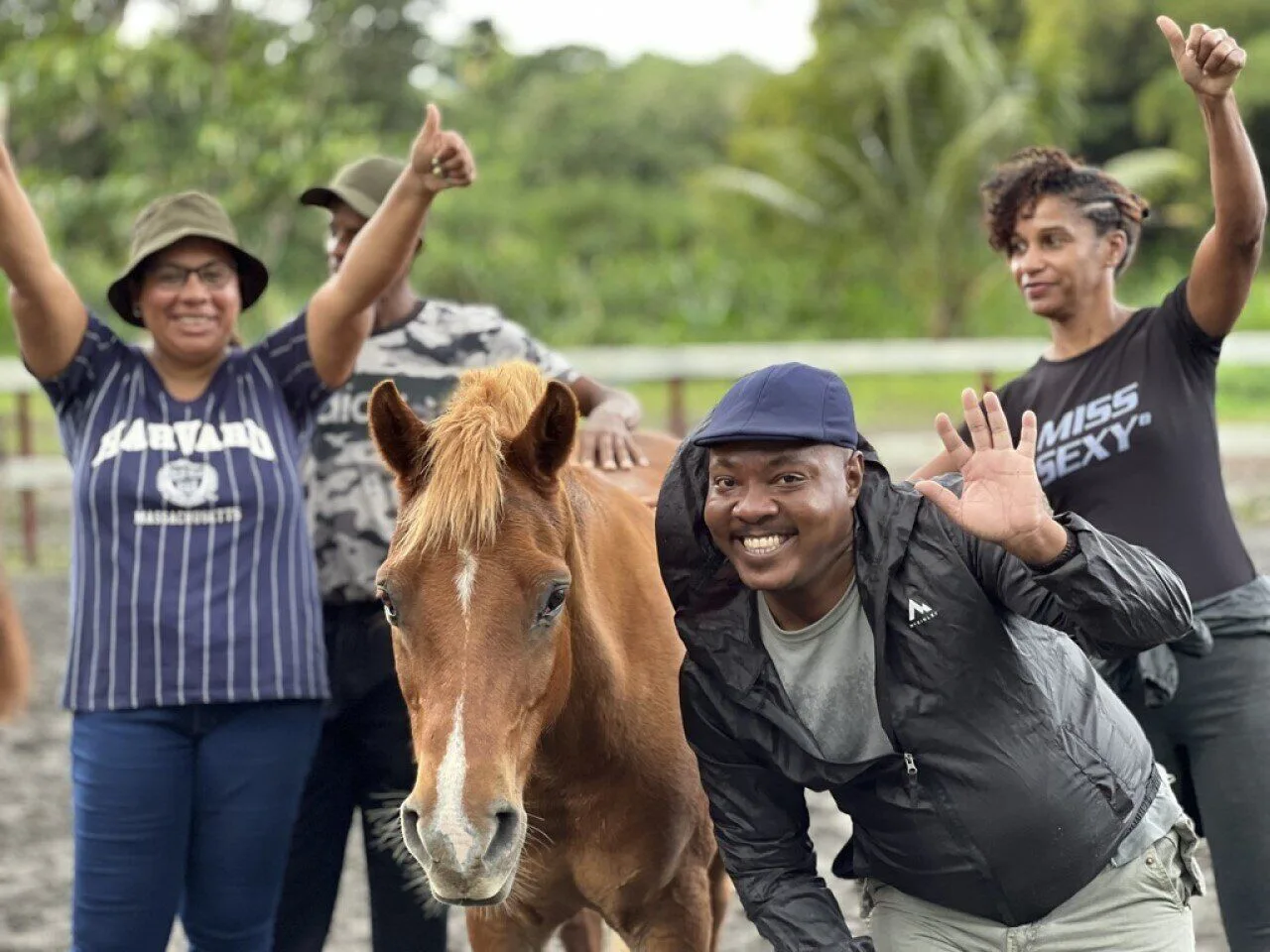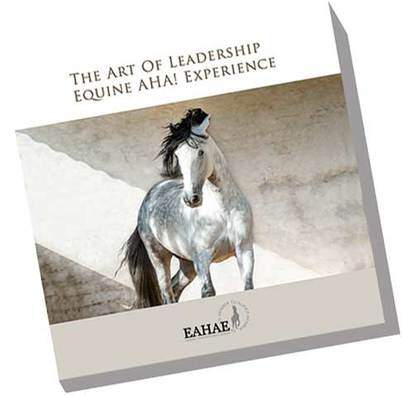
The HorseDream concept is the quality standard of our work. It was developed between 1996 and 1998 in Germany. Someone compared it to the invention of the wheel: it is simple, easy to use and highly effective. It reduces communication, leadership and teamwork to the core.
You can start with the one-day seminar “The Art of Leadership” (or: “The Art of Communication”, “The Art of Working Together”, “The Art of Managing Change”, “The Art of Sales”, “The Art of Adapting to Values”, etc.) You will be led through four hands-on exercises with horses. You will learn by experiencing, watching, and getting feedback in an emotionally safe environment without any judgment.
We asked “ChatGPT” what they know about our work since we have been doing it for more than 25 years. This is what they came up with:
Leadership, Team and Change
Equine-assisted interventions, such as horse-assisted education (HAE) or horse-assisted learning (EAL), are based on the interaction between humans and horses. Horses are very sensitive animals and can respond to nonverbal signals and subtle physical reactions, making them valuable partners in therapeutic or educational processes.
By working with horses, we can learn to become aware of and control how we use our bodies and express our emotions. These skills are especially relevant as many people lose or limit their physical and emotional expression skills through the constant use of digital devices.
By working with horses, we can also learn to focus on the present moment and detach from our digital distractions. Nature and animals can help us reconnect with our environment and remind us of the importance of spending time outdoors and disconnecting from our digital devices.
Overall, an equine-assisted intervention can help humans achieve digital and analogue balance by helping us rediscover our physical and emotional expressive abilities, focus on the present moment, and reconnect with nature.
A unique opportunity for leaders
An equine-assisted leadership seminar offers a unique opportunity for leaders to improve their skills and gain new insights into their leadership qualities.
Nonverbal Communication: Horses are highly responsive to nonverbal signals, such as posture, gestures and energy. A leadership seminar with horses can help you improve your nonverbal communication and better understand how your body language affects your leadership.
Trust and Relationship Management: Horses are flight animals that instinctively respond to threats. You must gain their trust and build a positive relationship to work with horses. It requires skills such as patience, empathy, assertiveness and respect. A leadership seminar with horses can help you hone these skills and transfer them to working with people.
Leadership in uncertainty and complexity: Horses are inherently unpredictable and often respond to unexpected events. A leadership seminar with horses can help you improve your ability to lead in uncertain and complex situations and respond quickly to new information and events.
Teamwork: In an equine-assisted leadership seminar, you usually work in small groups with one or more horses. You will need to work together to complete tasks and solve problems. It can help you improve your teamwork skills and your ability to work effectively with others.
Sustainability: An equine-assisted leadership seminar provides a unique opportunity to work in nature and connect with the environment. It can help create awareness of sustainability and environmental stewardship and encourage leaders to make sustainable decisions.
Team training for successful cooperation
There are good arguments for horse-supported team training:
Immediate feedback: Horses respond immediately to the nonverbal communication and behaviour of the people around them. They reflect the emotions and state of team members. Through interaction with the horses, participants receive immediate feedback on their leadership, communication, and body language. This direct feedback allows participants to adjust their behaviour and improve their skills.
Strengthening Team Dynamics: Horses are herd animals and highly value social bonds. To work effectively with a horse, team members must cooperate, build trust and establish clear communication. Equine-assisted team training helps build strong team dynamics by encouraging participants to pursue common goals, rely on each other, and work together.
Developing leadership skills: Horses accept natural and authentic leaders. Team members can develop and improve their leadership skills by working with horses. They learn to give clear instructions, make decisions, take responsibility, and effectively fulfil their leadership role. Equine-assisted training provides a unique opportunity to explore and experiment with different leadership approaches.
Enhancing communication: Horses respond to subtle signals and nonverbal communication. In equine-assisted team training, participants are encouraged to improve their communication skills.
Horses in the process of change
An equine-assisted seminar can have a significant impact on a change process. Equine-assisted seminars use the interaction between people and horses to promote personal development, communication, teamwork and leadership skills. In the context of a change process, they can have the following effects.
Experiential learning
Equine-assisted seminars provide a unique learning opportunity through direct experience. Participants work directly with horses and must apply their communication, leadership, and cooperation skills. These experiences can provide deep insights and knowledge about one’s behaviour and how it affects others.
Awareness of Behavioral Patterns
Horses are susceptible animals and respond to nonverbal signals and the energy of the people around them. They often reflect the emotions and behaviours of the participants. By working with horses, participants can become more aware observers of their behaviour and realize the impact their behaviour can have on others. It is an essential step in the change process to identify undesirable behaviours and develop new ones.
Developing leadership skills
Horses are natural herd animals who accept a leader. Participants can build their leadership skills by demonstrating clear communication, authenticity, presence and assertiveness. Horses respond positively to coherent and confident leadership, allowing participants to practice and improve their leadership skills in a safe environment.
Strengthening Team Spirit
Equine-led seminars often require teamwork to accomplish specific tasks or challenges. Participants must learn to communicate effectively, work together, and build trust to interact with the horses successfully. These experiences can strengthen team spirit and improve cohesion and collaboration within a change team.
Transfer to everyday life
The insights and experiences gained in an equine-assisted seminar can be transferred to everyday life and the change process. Participants can learn new skills and behaviours that help them communicate more effectively, resolve conflict, embrace change, and create a positive work environment.
Important to note
However, it is important to note that we view equine-assisted seminars as a complementary measure in a change process, not as the sole solution. They can provide valuable insight and experience and be part of a comprehensive change strategy.
For trainers and coaches
Our Train the Trainer seminars are aimed at people with horse experience who want to change their careers or expand their portfolio. We do not teach basics but impart the know-how for conducting horse-supported leadership seminars, team training, coaching with horses and systemic constellations with horses.
In the two-, three- or six-day workshops, we review the exercises that make up the HorseDream EAHAE International concept and the theoretical transfer models we use. Participation is associated with certification as a “Horse Assisted Educator based on the HorseDream concept. The classroom courses take place in the USA or Europe. Alternatively, dual seminars are offered in which the theory and feedback sessions occur online via Zoom, and the horse exercises take place on-site with the participants’ horses.
The two-day Train the Trainer seminar can also be booked as online seminar.
Online training for trainers
What are the benefits of online training for trainers who want to work with horses in leadership training and team development?
Online training for trainers who want to work with horses in leadership training and team development offers several advantages:
Flexibility
Online training allows trainers to set their own learning pace and schedule. They can complete the courses from anywhere as long as they have access to the Internet. It is especially beneficial for trainers who work in different regions or have other professional and personal commitments.
Accessibility
Online training allows trainers to access quality training content and resources regardless of location. They can benefit from the experience and expertise of renowned experts who may not be available in their immediate area.
Cost saving
Often, online training is more cost-effective than face-to-face seminars or workshops because it does not involve travel and accommodation costs. Trainers can purchase training content at a lower price and may have access to additional resources such as videos, learning materials, and community forums included in the price.
Variety of learning resources
Online training often offers a variety of learning resources such as video tutorials, digital worksheets, case studies, and interactive exercises. It allows trainers to target different types of learners and develop their understanding and skills in various ways.
Contemporary knowledge
Through online training, trainers can access current trends, insights, and best practices in equine-based leadership training and team development. Online courses can be updated regularly to ensure participants are present on the latest developments.
Important to note
It is important to note that the success of online training also depends on the self-discipline and motivation of the trainer. Participants must be actively engaged and take ownership of their learning progress.


